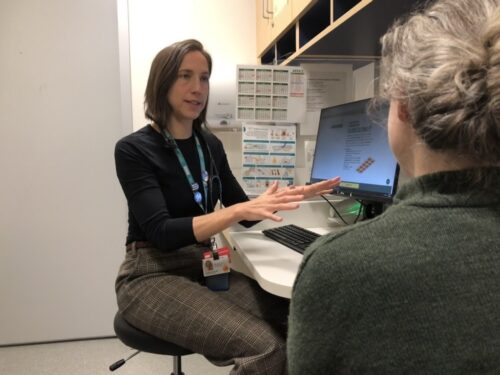A Missed Opportunity for Medication for Opioid Use Disorder (MOUD) Initiation: Infective Endocarditis Hospitalization
November 4, 2020

Getty Images
It is expected that by 2030, more than 257,000 people with opioid use disorder will have died from endocarditis associated with injection drug use.
THE BOTTOM LINE | Medication for opioid use disorder (MOUD) is an important first step to treat individuals with opioid use disorder (OUD) who have been hospitalized due to injection drug use-associated infective endocarditis — but physicians are missing over 75% of people who could benefit from MOUD initiation during these hospitalizations, and aren’t retaining those who do receive medication. These missed opportunities for care are contributing to the persistent, high mortality rates due to the opioid epidemic.
CONTEXT | Mounting evidence demonstrates that MOUD save lives; yet many individuals don’t receive medication treatment after experiencing an issue related to their substance use disorder. In one study, only three of 10 individuals received a medication after surviving an overdose, and another study showed that a majority of individuals who underwent medically-managed withdrawal, or detox, did not receive additional treatment for their substance use disorder.
But overdose and detox are not the only opportunities for clinicians to diagnose and treat opioid use with MOUD. Between 2008 and 2014, the rates of hospitalizations related to injection drug use-associated infective endocarditis doubled — and approximately 10% of infective endocarditis hospitalizations in the U.S. are now attributed to injection drug use. It is expected that by 2030, more than 257,000 people will have died from endocarditis associated with injection drug use. However, it is not clear how frequently patients with injection drug use-associated endocarditis receive MOUD after their hospitalization, and the impact these medications have on mortality.
STUDY OBJECTIVE | Determine how often individuals hospitalized with injection drug use-associated infective endocarditis are treated with MOUD after they are discharged — and if mortality rates differ based on their treatment.
THE DETAILS | 679 individuals between the ages of 18 and 64 discharged from the hospital after being diagnosed with injection drug use-associated infective endocarditis between 2011 and 2015 in Massachusetts were included (60.8% were male; average age of 39.2 years). Individuals had to have one medical claim filed in the previous six months for opioid use disorder, drug use, or hepatitis C, and to have survived two months after discharge to be included in the study. Data from the Massachusetts Department of Public Health was used to determine mortality and whether individuals received treatment with MOUD before and after hospitalization.
FINDINGS | 61 of the 679 individuals died within 10 months. 134 individuals, or approximately 20%, received MOUD in the three months before their hospitalization, and 165 (24%) received MOUD within three months after discharge — primarily buprenorphine. During the year after their discharge, a person’s chance of dying in any month was 70% lower if they received a medication that month. When researchers followed people who received MOUD within three months after discharge (whether they continued to take the MOUD or not), it had no effect on their mortality.
PULL QUOTE | “Less than a quarter of the individuals in our study received medication for opioid use disorder after they were discharged following infective endocarditis. This suggests that the inpatient hospitalization was a missed opportunity to initiate these patients in medication treatment for their opioid use disorder. Just as important, however, is keeping these individuals engaged in treatment after they are discharged, which suggests the need for greater support and interventions tailored for these patients as they navigate treatment after they are discharged.”
Source: Kimmel SD, Walley AY, and Yijing L. (2020). “Association of Treatment With Medications for Opioid Use Disorder With Mortality After Hospitalization for Injection Drug Use—Associated Infective Endocarditis.” JAMA Network Open.



